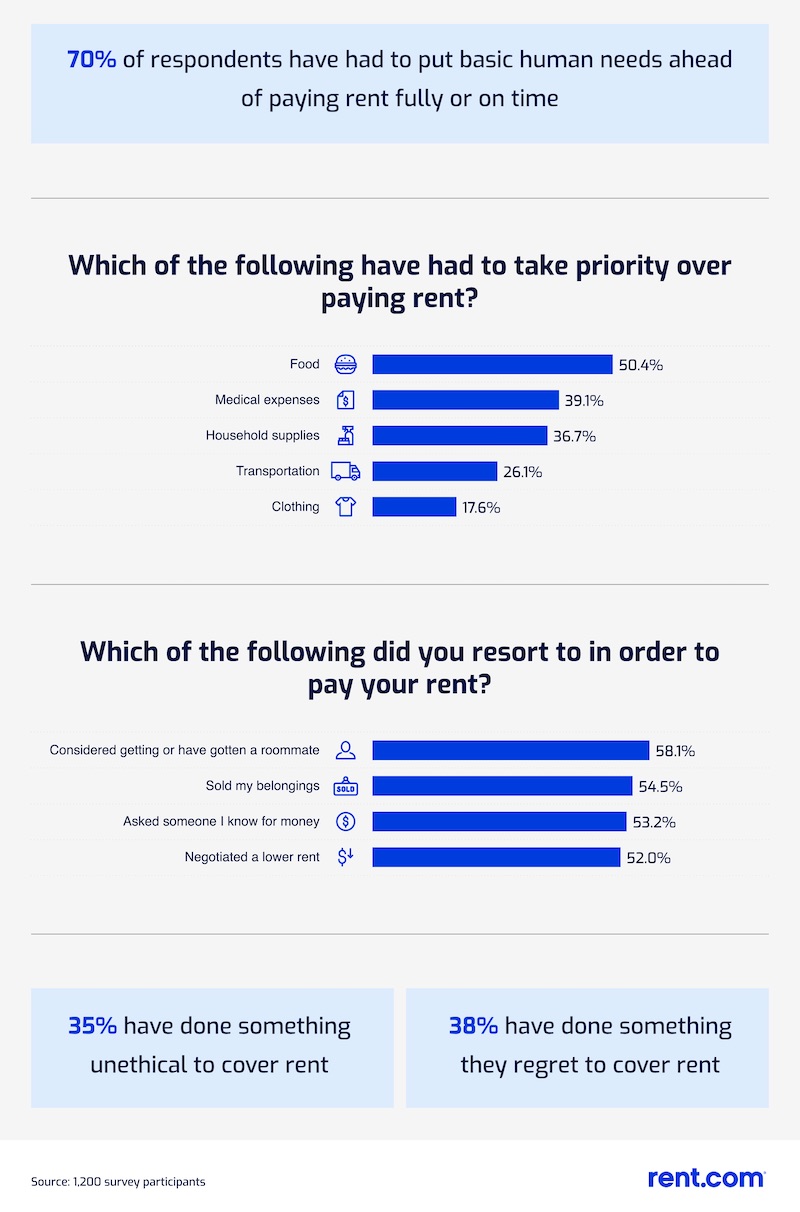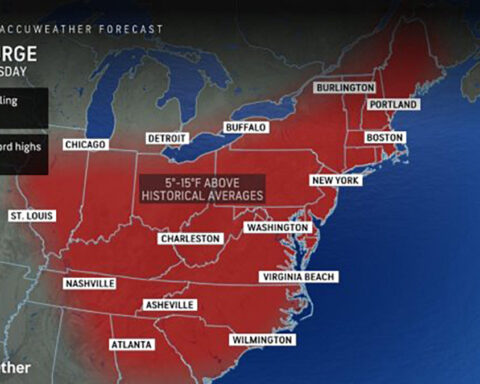Editor’s note: This article appears courtesy Rent.com.
Income insecurity stemming from the COVID-19 pandemic has made it more difficult than ever for renters to pay their rent fully or on time. Layoffs, furloughs and other job market changes have forced more people than ever to choose between covering basic necessities and paying rent on their homes.
Stimulus money and another extension of the national rent moratorium have helped renters’ problems in the short term, although less than half of renters in our survey received rent payment relief. And still, the fact remains: The rent must get paid sometime.
When we surveyed 1,200 people to learn about the reality of renting during the pandemic, we found that renters are feeling immense distress about their ability to pay the rent, even if they could afford it prior to COVID-19.
Paying rent during COVID-19
More than half of respondents have worried about being — or have been — evicted from their homes during the pandemic. And it’s affecting their mental health as well as their wallets.
When the pandemic caused significant financial difficulty for many people, it, in turn, created housing insecurity. According to our survey results, almost half of renters (48.6%) are behind on rent payments. Not only that, but more than two-thirds (68.4%) are concerned about their ability to pay in the future.
More than half have worried about being evicted, but an unlucky 6.8% actually have been evicted from their homes during the pandemic.
Making ends meet during the pandemic
Despite widespread reports of eviction moratoriums, it is clear that these breaks were far from universal.
Only 45% of respondents reported having their rent payments formally deferred due to the pandemic, and less than half got outright relief from rent payments.
Many people are already paying all they can afford for rent. Two in five wouldn’t be able to handle a sudden $150 monthly increase in rent payments at this time.
Choosing which expenses to cover — and how
Because less than half of renters received rent payment relief or formal deferments, many found themselves having to prioritize their expenses. For most, rent wasn’t high on the list.

Renters who have had trouble paying haven’t just gone silent on their landlords; they have taken steps to alleviate the problem. More than half (52%) have tried to negotiate lower rental rates — if you’re among them, consider writing a rent reduction letter to your landlord. We’ve outlined how to do so effectively here.
A similar number of renters (53.2%) have borrowed money from people they know. Even more (55%) sold some of their belongings to get money for rent.
Nearly half of respondents (43.7%) say they’ve considered taking on a roommate, and 14.4% have taken the step of bringing a roommate into the house.
Among the 70% of renters who’ve had to choose between rent and other necessities, more than half of those (50%) chose food over rent.
Nearly 40% prioritized medical expenses (39.1%) or household needs (36.7%). More than a quarter (26.1%) chose to pay for transportation costs over rent.
Sadly, one in three renters has done something they consider unethical to cover their rent payments. And 38% report having done something they regret to come up with the money.
The threat of evictions during COVID-19
The threat of eviction causes people both social and mental stress. A majority of people, 68%, are so worried about being evicted that it’s taking a toll on their mental health in the form of stress or anxiety.
An overwhelming number of people (82%) say that being evicted would cause them lasting negative mental health effects.

Seventy-two percent of renters surveyed say they would be ashamed of an eviction and try to hide it. Over half say they would treat a tenant differently than their landlord treats them.
One in 10 have an extra concern about eviction: their children’s schooling or care, which would be affected by an eviction. Most of those who have children and were surveyed say they have felt threatened by the possibility of eviction.
Most people, about 2/3, have somewhere to go if they get evicted. Staying with parents or friends is the top choice of where to go right away. Extended family, siblings or a significant other are also choices, but they are far down on the list.

These, however, are temporary solutions. Survey respondents gave a wide variety of responses when asked how long it would be okay to stay with other people. A few percent said that it would only be acceptable to stay for two weeks, while 16.65% said it would be fine to stay for over a year. A slightly larger percentage of respondents, 18.5%, said that a month was long enough.
This wide variance in responses speaks to the variety in relationship types and the details of those relationships. Every individual would have to assess his or her social circle to determine how long they could comfortably stay with a particular person (or people) that they know.
Many people, especially younger ones, have been known to “couch surf” — going from one friend’s house to another to avoid wearing out one’s welcome at any particular stop. Most prefer to stop doing this as soon as they can, preferring a stable base, but this isn’t always the case.
We asked survey takers the question, “If you were evicted tomorrow, what areas of your life would be affected?” This is how the responses broke down:
Almost half (49%) said their access to family, friends or a romantic partner would be compromised.
A slightly smaller number (42%) worried about their ability to do their work or hang on to their jobs, which raises the issue of cascading financial problems resulting from evictions.
Fewer than 10% said their children’s school or child care status would be affected.
Evicting tenants — just business or problematic?
Even though landlords cannot pay for buildings or houses without getting rent payments to cover their expenses, 3 out of 5 people see evictions as “problematic” instead of just being part of the business. After all, the rental business affects every area of renters’ lives.
As a result, 43% of renters reported that they don’t feel bad for landlords who have tenants who can’t pay.

A significant percentage of people — close to two-thirds at 61.4% — believe that evictions are tied to race or ethnicity. As with many beliefs, the validity of this belief is difficult to gauge without further extensive study.
It could be argued that buildings and houses cost landlords the same amount to buy, regardless of who the tenants will be. Maintenance costs are largely tied to market conditions and factors specific to the property, such as age and climate. And for their bottom line, few landlords can afford to allow any non-paying tenant to stay forever, regardless of their personal opinions.
However, the United States’ well-documented history of racial segregation and housing discrimination makes it easy to understand how a vast majority of people would assume the same effects extend into rental markets. And since numerous other effects of COVID-19 have disproportionately affected communities of color, it’s natural to assume that evictions would rank among them.
The pandemic has impacted both renters and landlords
Renters, like everyone else, have endured serious trials during the fallout from the COVID-19 pandemic. An already widening gap between America’s haves and have-nots has been exacerbated by the financial effects of widespread job furloughs, layoffs and business closures.
Many people have been left with having to choose between paying rent, finding a cheaper apartment and covering other basic needs — and some have suffered eviction as a result. Even those who have been able to stay in their rentals are feeling psychological effects from the threat of eviction.
But the U.S. economy continues to rebound in the wake of federal relief packages and the global COVID vaccine rollout. That means there is hope for landlords and renters, alike.
Methodology
The study was conducted online on June 15, 2021, with a total of 1,200 participants, 100% of whom rent their homes. The study participants were 58.5% male, 40.8% female and 0.7% non-binary. They ranged in age from 18 to 70, with an average age of 37, and 55.9% have children living at home.

















You must be logged in to post a comment.